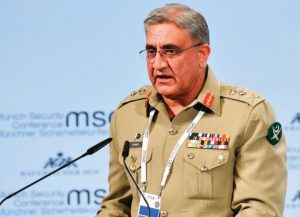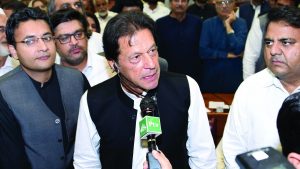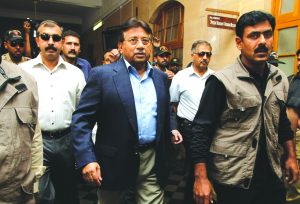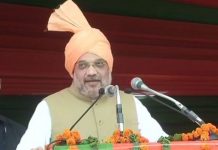 The New Year ushers in Pakistan with the further sharpening of conflicts within the establishment, an euphemism generally used for the general army headquarters (GHQ). However, there are two indications that, firstly, the pre-dominant Punjabi establishment is ready to abandon General Pervez Musharraf, the country’s first army chief, from the Mohajirs or the people who had migrated from UP (India), and secondly, the issue is how much support the GHQ should extend to the present incumbent, General Qamar Javed Bajwa, who many believe does not belong to the hardcore Punjabi-Sunni family, facing an existential challenge.
The New Year ushers in Pakistan with the further sharpening of conflicts within the establishment, an euphemism generally used for the general army headquarters (GHQ). However, there are two indications that, firstly, the pre-dominant Punjabi establishment is ready to abandon General Pervez Musharraf, the country’s first army chief, from the Mohajirs or the people who had migrated from UP (India), and secondly, the issue is how much support the GHQ should extend to the present incumbent, General Qamar Javed Bajwa, who many believe does not belong to the hardcore Punjabi-Sunni family, facing an existential challenge.
During the past more than six decades, the GHQ has been the centre of power in Pakistan. The pre-dominant role of the armed forces had begun with the assassination of the country’s first Prime Minister Nawabzada Liaquat Ali Khan on October 16, 1951. He was shot at point blank by a military officer having an Afghan identity. It has never been explained why the assassin, who had surrendered, was immediately shot dead by the police officer on duty. Thus, the conspiracy behind this high-profile murder could never be revealed.
It is also true that one of the founders of Pakistan, Liaqat Ali Khan, born in a rich Jat family of Karnal, present day Haryana, could not get elected from any constituency of West Pakistan. He could be elected to the Pakistan Constituent Assembly from East Bengal, now Bangladesh.
It goes to the credit of General Musharraf that he was the first Mohajir or non-Punjabi, who could rule the country for almost eight years following the sudden exit of Liaqat from the country’s political horizon in 1951. He had toppled the then elected Prime minister, Nawaz Sharif, who had dared to remove him the post of the army chief. His predecessor General Zia-ul-Haq could hang Z.A. Bhutto, but Musharraf could not manipulate a judicial hanging for Nawaz Sharif. The reason could be that Bhutto hailed from Sind. Since Sindis do not have much presence in the armed forces, Zia could hang him.
Zia and his supporters among the religious leaders had also painted him as corrupt, womanizer drunkard political leader. In case of Sharif being a hard core Punjab could not be eliminated. The Punjab province has huge presence in the Pakistani defense forces as well as in the civil administration. The commanders and soldiers comprising overwhelming presence hail from the province. In the case of Bajwa, who claims his origin from the Jats of Sialkot, is also believed to have an Ahmedia or Qadiani background. Therefore, it is difficult to predict that whether he would get whole-hearted support from the GHQ in his bid to brow-beat higher judiciary in the country, which had declared rejected his three year extension in the force. He was however been given six months extension enabling the Imran Khan government to correct the procedural lapses.
REVIEW PETITION
 The decision of the Khan government to file review petition against the three-bench decision of the Supreme Court in the case of enacting suitable law for the appointment and service conditions of the army chief is also intriguing. The attorney general of Pakistan had given an undertaking before the apex court that the government would enact suitable law to streamline the appointment of the army chief.
The decision of the Khan government to file review petition against the three-bench decision of the Supreme Court in the case of enacting suitable law for the appointment and service conditions of the army chief is also intriguing. The attorney general of Pakistan had given an undertaking before the apex court that the government would enact suitable law to streamline the appointment of the army chief.
There are people in Islamabad, who point out that Imran Khan deliberately did not follow the prescribed procedure of extending Bajwa’s extension by getting the cabinet’s approval and endorsement of the president. He had announced by issuing the extension order by his own signature, which could not be described the appropriate order. Again, instead of making suitable legal amendments, his government has filed a revision petition.
The plea taken in the petition, mostly legal experts opine, that they do not be able to get legal endorsement. It cannot be stated that the issue had never faced any judicial scrutiny cannot be examined by the apex court. In the present context, it is unlikely that the core commanders or GHQ will put guns on the Supreme Court judges to get the petition approved.
The November order of the Pakistan Supreme Court has allowed the present incumbent, Bajwa, to continue only for next six more months. It is an adequate time given to the government to enact suitable law for the appointment of the army chief and his tenure, but instead of having a dialogue with the main Opposition, Khan has adopted a confrontational approach with them. While Bajwa might have preferred amendment in the law and if necessary in the basic law of the land to resolve the legal lacunae, but the government is continuing arresting the opposition leaders. Thus, he appears to be avoiding any meaningful dialogue with the parties. Meanwhile, the main opposition parties, the Pakistan People’s Party and Pakistan Muslim League (Noon), have indicated that they would be ready to cooperate with the government on this sensitive issue, but the present persecution of Sharif’s daughter and Zardari-Bhutto family have to be discontinued.
The year 2020, if effective measures were not taken, may witness a renewed effort of the Khan government to bring a confrontation between the higher judiciary and the army headquarters. The option before the GHQ is either to abandon Bajwa and Musharraf or to use physical power to subjugate the well-known independent minded superior judges. There are reports of unhappiness among the ore commanders on the issue of the extension to Bajwa, and the army may not like to have a confrontation with the judiciary to save the much-maligned Musharraf, a Muhajir having little following in the armed forces and among common Pakistanis.
The months of the November and December 2019 were epoch-making and historical in the history of Pakistan, when the judiciary tried to rein in some order or procedure in the appointment of the army chief. Also a special court convicted and gave him death sentence to Musharraf for suspending constitution as a high treason. The presiding judge Waqar Aemad Seth has also observed that if (MUsharraf) dies before being brought to Pakistan, his corpse should be hanged for three days at the Democracy crossing in front of the National Assembly in Rawalpindi.
Musharraf, who had toppled the civilian government led by Nawaz Sharif in 1999 had superseded the Pakistani Constitution in 2007 and had imposed Emergency in the country and also detained more than 100 judges.
There are serious cases against this former military dictator such as the assassinations of the Balaoch leader, Akbar Bugti in 2006, Benazir Bhutto and killing of an eminent cleric in the red mosque siege in 2007 respectively.
Imran Invokes Spirits!
Imran Khan was away during the Christmas holidays to his huge residence at Bani Gala, a suburb in Lahore, to reportedly invoke certain spirits by this wife, Bushra Bibi, who is known to be a spiritualist. She is housewife and the third spouse, who he had married just six months before he assumed office as Prime Minister. His second wife, Reham Khan, a former BBC anchor and author, lives in London.
Most of the journalists and political analysts of Paksitan, including Hasan NIsar and Najam Sethi, had expected that Imran Khan would be abiding by the instructions of the court, but he appears to have embarked upon the dangerous route of taming the judiciary. Instead of issuing summons to Musharraf to return to Pakistan, he appears to be wasting time. Emboldened by his dilly dallying, the fugitive convicted Musharraf has become emboldened and confidant to hold press conferences and give media interviews. It appears, he was sick only for avoiding the court trials.
Khan has suddenly received support of the convicted general, who told a group of Pakistani journalists in Dubai on Friday, December 27, that he was going to revamp his defunct political outfit, All Pakistan Muslim League (APML).His support to Imran Khan’s Pakistan Tehreek-e-Insaf (PTI) was unconditional. APML’s support, though a weak political outfit, may be welcomed by PTI. The PTI, though supported by the GHQ under Bajwa, appears to be losing its power-base in the country, especially in Punjab. Its support may have some psychological value.
It is true that there will be hardly any political impact of the APML on the political fortune of Imran Khan. It had won only one seat in the National Assembly with a total poll share of 54,231 (0.12 per cent) in the 2013 elections, and its further declined was witnessed in the 2018 elections, when the party polled only 36, 566 votes (0.07 per cent) without winning a single seat in the House.
Interestingly, Musharraf, a Mohajir, has always tried to identify himself with the Punjabis. In this crisis-ridden evening of his life, he should not have expected much support. He has hardly any support base among the Mohajirs in Sind. The Sindhis never identify themselves with the Pakistani army and Mohajrs.
With the assassination of Benazir, Musharraf too is a much-hated general like Zia-u-Haq, who had manipulated a judicial hanging of Z.A. Bhutto, the first elected prime minister of Pakistan.
The times have changed in Pakistan too.Neither Musharraf nor Bajwa can rule Pakistan like Ayub Khan, who could manipulate the polls and had ensured the defeat of Fatima Jinnha, the sister of Muhammed Ali Jinnah. They cannot tame the judiciary.
During the Ayub regime, the judiciary was totally subservient to the military dictator. The then chief justice of the West Pakistan High Court, M.R. Kiyani, had to apologize for his observations before a legal gathering in Karachi, when he told the audience, “There are quite a few thousand men who would rather have the freedom of speech than a new pair of clothes and it is these who form a nation, not the office hunters, the license hunters, even the tillers of soil and drawers of water”. It irked the military authorities that two days later, the chief justice was forced to apologize, because it was considered to be an offence to the officers.
The coming months will be quite tumultuous in Pakistan. Both Bajwa and his crony Imran are keen to force the judiciary to succumb to their pressure. The present mood of the civil society in the country despite the rampant corruption, collapse of rule of law and crumbling economy, it is difficult for anyone to force the Chief Justice of Pakistan and other judges to tender apology to the military establishment. It is being keenly watched the outcome of the review petition filed by Attorney General Anwar Mansoor. The government has urged the apex court to form a larger bench to hear the case and set aside the earlier judgment. It also requested the court to keep the proceedings in-camera. A three-member apex court bench headed by then chief justice Asif Saeed Khosa on November 28 granted a six-month extension to Gen Bajwa after being assured by the government that Parliament will pass the necessary legislation on the extension or reappointment of an army chief within six months. The general practice is to dismiss such review petitions summarily, but it may witness a high-voltage judicial proceedings in the neighboring country.
Musharraf may never face trial for murders of Benazir and Bugti
 In spite of his assertion in Dubai before a select press gathering on Friday, December 27, 2019 that there is an amicable atmosphere for his return to Pakistan, few really believed Pervez Musharraf already convicted and faces gallows under the high-treason charges, would really ever dare to make a comeback.
In spite of his assertion in Dubai before a select press gathering on Friday, December 27, 2019 that there is an amicable atmosphere for his return to Pakistan, few really believed Pervez Musharraf already convicted and faces gallows under the high-treason charges, would really ever dare to make a comeback.
The trial court had punished two senior police officers in 2017 for their negligence, when she was attacked. They have been given 17 –year jail term, but Musharraf with the help of his supporters in the GHQ successfully evaded the court summons.
The court has declared him a fugitive and also ordered the confiscation of his properties in Pakistan. It took almost a decade to complete the trial of the crime committed in 2007. There is dismay among lawyers and those connected with the human rights issue that the failure of the trial court to bring Musharraf, who “shamelessly” appears on international and Pakistani television channels regularly.
Musharraf’s confidence emanates from the fact that as many as 16 of his loyalists occupy key positions in the Imran Khan’s administration. Notable among them is Ejaz Shah, who has become Pakistan’s Interior Minister. He had served the Pakistani army and also known for having close links with terrorist organizations. Musharraf had posted him to Australia as Pakistan’s High Commissioner, but the Australian Government declined to receive him as he was known for his terror connections.
One of the most charismatic leaders of the Indian subcontinent, Benazir, who had left Pakistan amidst unsubstantiated corruption accusations, was received to an unprecedented welcome in Karachi. She had come to campaign for the 2008 polls. Before the Federal Investigation Agency in 2009, a well-known American journalist, Mark Siegel, had testified that she had sent him an email on October 26, 2007, in which she stated, “if something terrible happened to her, she would hold Musharraf responsible apart from individuals Shah, now a minister in the Imran Khan government, ex-ISI chief Hamid Gul, Chaudhry Pervaiz Elahi, presently speaker of the Punjab Provincial Assembly and Arbab Ghulam Rahim, the then chief minister of Sind.
In 2009, an American journalist, Mark Siegel, had testified that Musharraf had warned Bhutto about her safety and security on her return to Pakistan. It was during one of her public rallies, leading up to the 2008 elections, that Bhutto was first attacked by terrorists who had planted two bombs in the crowd. Bhutto survived that attack, which killed 149 people, but in another rally two months later, on 27 December in Rawalpindi, her car came under fire, before a suicide bomber detonated nearby.
Former president and military ruler Musharraf is alleged to have been part of a broad conspiracy to have his political rival killed before elections. He has denied the allegation, but has been evading his trial.
He was charged with murder, criminal conspiracy for murder, and facilitation of murder in 2013.
letters@tehelka.com











